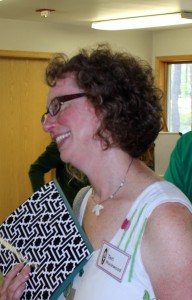by Teri Rockwood, May 19, 2013
The Rev. Dr. Kendyl Gibbons wrote in the Spring 2012 issue of the UU World magazine the following:
“We come together because we are creatures who are fundamentally, physiologically incomplete. As much as our individuality defines us, we also need other people to make our limbic circuits function the way evolution has built us. To the core of our chemistry and our neural networks, we are a social species. Our physical, emotional, intellectual, and spiritual well-being depends on our connections—both to the world of nature, and to our fellow humans. Spirituality for skeptics is about keeping alive that connective tissue that makes us who we are and enables us to imagine what we might yet become. Some of that work we do alone, in moments of inspiration or insight, but more of it happens in the company of other seekers, those who share the skeptical path with us, insisting on the freedom of conscience and the integrity of doubt. We do it by grappling with the deep questions and the big ideas. We do it simply, by sitting next to each other, by speaking forth our joys and sorrows, by sharing soup, by lifting our hearts in praise of this amazing earth and our astonishing lives, by making music with our blended voices.” And by carrying on traditions like the Flower Communion that we are celebrating today.
The Reverend Nobert Capek started this most wondrous tradition many years ago in Prague Czechoslovakia with the 6th Principle in mind… which states “We, the member congregations of the Unitarian Universalist Association, covenant to affirm and promote the goal of world community with peace, liberty, and justice for all.”
Ken Collier, in his book “Our Seven Principles in Story and Verse” writes about the idea of community in the chapter about the 6th principle.
It states…”Let us begin with the idea of community. Unitarian Universalists sometimes spend so much time and energy worrying about and praising the autonomy of the individual that we forget that individuals standing alone have about as much strength as a bunch of stones lying around on the ground. It is only when a mason picks up these stones and builds a wall that they become powerful. And that is how it is with communities. Alone, we’re not much; together we have power. In fact, some people believe that the idea of an individual makes no sense except in the context of community. How can you have individuals who have no relationships or communal ties?
Let us also be reminded of a story that the Reverend William Schulz tells. In the Middle Ages, a certain order of monks lived quietly at their monastery and part of their rule was that periodically they each to on an individual retreat. The length of the retreat was up to the individual monk and for some it would last a very long time indeed. One day a monk sought out the Abbot and asked for permission to go on his retreat. The Abbot gave his permission and off the monk went.
The monk came to the hermitage and opened a Bible that was there. It happened to open to a passage in the Gospel of John that described Jesus washing his disciples’ feet. The monk read that passage and meditated on it for a couple of days, then abruptly got up and returned to the monastery. As was the custom, he presented himself to the Abbot, who was surprised to see him return so soon.
“So, You have returned already,” said the Abbot.
The monk replied, “Of course. For whose feet would the hermit wash?”
And that is what community is about. It is about washing feet, serving each other in humility and generosity. It is about creating ways to help each other. It is about reaching to each other and touching, sometimes literally, with a gentle and healing hand, sometimes with food or clothing, sometimes with a place with the caress of a soul. And it means reaching out and asking for help, for do we not deny each other when we refuse to give to others the opportunity to help us?
In the first Unitarian Universalist Principle, we extol the inherent worth and dignity of each human being. Yet it remains true that with no one’s feet to wash, it is impossible for that very worth and dignity to be manifest or celebrated. In community it becomes possible for our humanity to grow, flower, and bear fruit. We never come to fruition alone and in a vacuum, but only in community, touching and serving each other, and living in creative tension together.
May we find peace, liberty, and justice filling the days of our lives and spreading outward, touching the lives of all, that we may all grow ever more deeply, ever more fully, ever more genuinely human, connected, healed, and at peace. And may we be as relatives to all beings.

